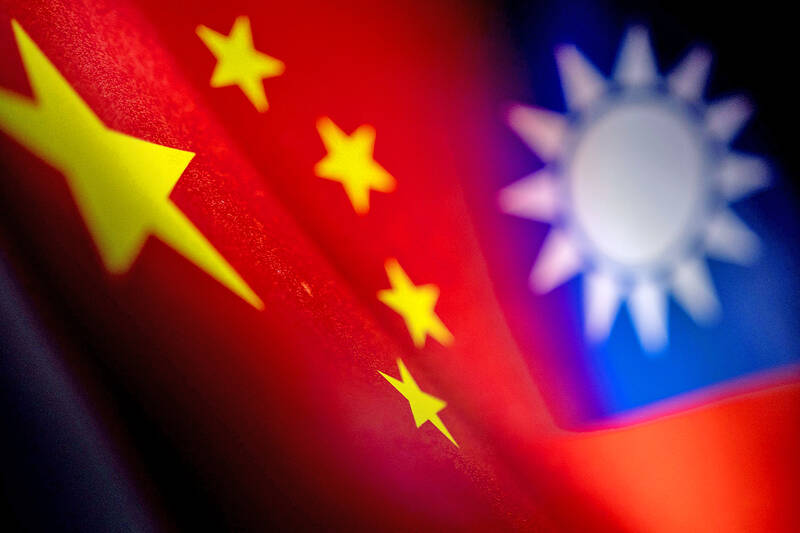Interest among the Chinese public in the issue of China’s unification with Taiwan is low, researchers said, citing the results of a poll.
An article titled “Assessing Public Support for (Non-)Peaceful Unification with Taiwan: Evidence from a Nationwide Survey in China,” published in the Journal of Contemporary China on May 14, showed that only 55 percent of those surveyed in China would support the use of military force to achieve unification with Taiwan.
In the survey, which polled 1,824 people on the question of how they would like to see the issue of Taiwan’s unification with China resolved, “only one out of one hundred rejected all but the most extreme option of wutong (武統, unification through military force),” the researchers wrote.

Photo: Reuters
The survey presented respondents with five options regarding Taiwan: to achieve unification through military force; to invade Kinmen and Lienchiang counties and force Taiwan to surrender; to use economic sanctions to force negotiations; to maintain the “status quo” and strengthen China’s national power to encourage Taiwan to voluntarily seek unification; or to allow Taiwan to choose its own path, including independence.
Support for most options was nearly equal, except for the option that included Taiwan’s independence, which 22 percent supported.
University of Miami political science researcher June Teufel Dreyer commented on the results during a Radio Free Asia program on Monday.
“This obviously does not support [Chinese President] Xi Jinping’s (習近平) statement that ‘the whole country is eagerly looking forward to the return of Taiwan,’” she said.
RAND Corp Hu Taiwan Policy Initiative director Raymond Kuo (郭泓均) also commented on the survey, saying that support in China for the use of military force against Taiwan might be even lower than what the survey reflects.
Based on research on the level of self-censorship practiced by Chinese when taking polls, the actual percentage of those who support military force might be closer to 25 percent, he said.
Chinese would also be influenced by a number of other factors, including China’s human rights situation, political factors and the possibility of US involvement in a conflict in the Taiwan Strait, he said.
National University of Singapore researcher Adam Liu (劉遙), who is one of the coauthors of the article, said that China’s rhetoric on Taiwan had toughened in comparison with when former Chinese presidents Hu Jintao (胡錦濤) and Wen Jiabao (溫家寶) were in power, which might be attributed to US-China tensions or to the administration of President Tsai Ing-wen (蔡英文), but Chinese would likely accept their government having a softer stance toward Taiwan.

CHAOS: Iranians took to the streets playing celebratory music after reports of Khamenei’s death on Saturday, while mourners also gathered in Tehran yesterday Iranian Supreme Leader Ayatollah Ali Khamenei was killed in a major attack on Iran launched by Israel and the US, throwing the future of the Islamic republic into doubt and raising the risk of regional instability. Iranian state television and the state-run IRNA news agency announced the 86-year-old’s death early yesterday. US President Donald Trump said it gave Iranians their “greatest chance” to “take back” their country. The announcements came after a joint US and Israeli aerial bombardment that targeted Iranian military and governmental sites. Trump said the “heavy and pinpoint bombing” would continue through the week or as long

TRUST: The KMT said it respected the US’ timing and considerations, and hoped it would continue to honor its commitments to helping Taiwan bolster its defenses and deterrence US President Donald Trump is delaying a multibillion-dollar arms sale to Taiwan to ensure his visit to Beijing is successful, a New York Times report said. The weapons sales package has stalled in the US Department of State, the report said, citing US officials it did not identify. The White House has told agencies not to push forward ahead of Trump’s meeting with Chinese President Xi Jinping (習近平), it said. The two last month held a phone call to discuss trade and geopolitical flashpoints ahead of the summit. Xi raised the Taiwan issue and urged the US to handle arms sales to

BIG SPENDERS: Foreign investors bought the most Taiwan equities since 2005, signaling confidence that an AI boom would continue to benefit chipmakers Taiwan Semiconductor Manufacturing Co’s (TSMC, 台積電) market capitalization swelled to US$2 trillion for the first time following a 4.25 percent rally in its American depositary receipts (ADR) overnight, putting the world’s biggest contract chipmaker sixth on the list of the world’s biggest companies by market capitalization, just behind Amazon.com Inc. The site CompaniesMarketcap.com ranked TSMC ahead of Saudi Aramco and Meta Platforms Inc. The Taiwanese company’s ADRs on Tuesday surged to US$385.75 on the New York Stock Exchange, as strong demand for artificial intelligence (AI) applications led to chip supply constraints and boost revenue growth to record-breaking levels. Each TSMC ADR represents

Pro-democracy media tycoon Jimmy Lai’s (黎智英) fraud conviction and prison sentence were yesterday overturned by a Hong Kong court, in a surprise legal decision that comes soon after Lai was jailed for 20 years on a separate national security charge. Judges Jeremy Poon (潘兆初), Anthea Pang (彭寶琴) and Derek Pang (彭偉昌) said in the judgement that they allowed the appeal from Lai, and another defendant in the case, to proceed, as a lower court judge had “erred.” “The Court of Appeal gave them leave to appeal against their conviction, allowed their appeals, quashed the convictions and set aside the sentences,” the judges